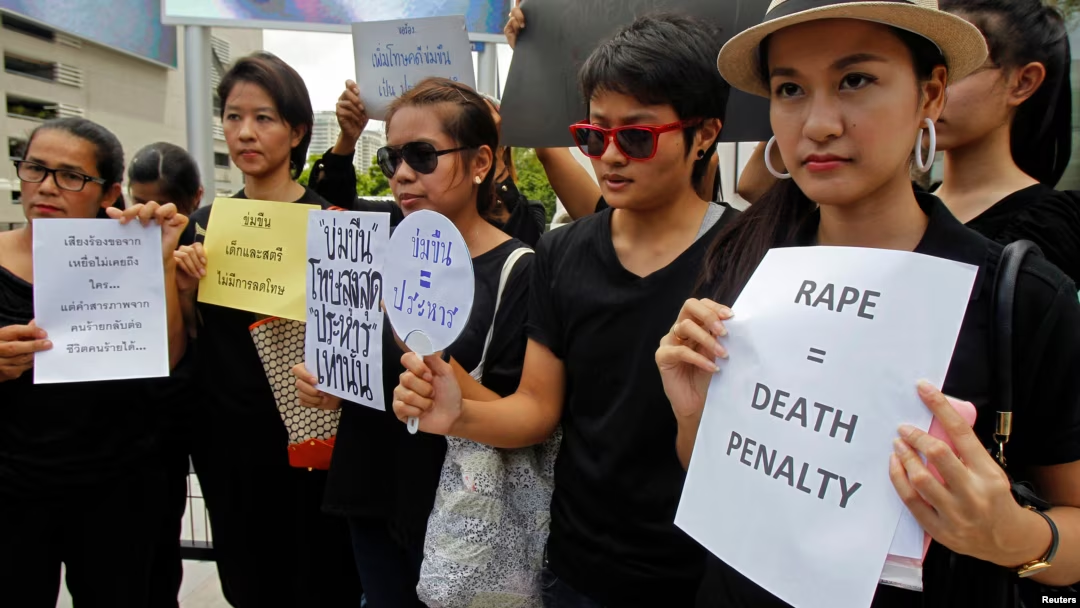SAMUT PRAKAN – Police have arrested a 53-year-old man after an 84-year-old woman was found in serious condition after a violent assault and attempted rape inside her home on Monday in Samut Prakan, just south of Bangkok.
Police and rescue workers from the Ruamkatanyu Foundation were alerted at about 3 pm on Monday by neighbours in Moo 3, Bang Chalong, Bang Phli. They arrived at a single-storey wooden house beside a canal and found the victim on her bed with several injuries.
The 84-year-old woman had a broken right little finger, a head wound, heavy bruising on her chest, a deep cut on her left wrist, and another wound behind her ear. Volunteers gave first aid, then took her to a nearby hospital.
She told police officers she was alone late at night when a man entered her home, beat her, and tried to rape her. She said he spoke broken Thai with what sounded like a Khmer accent. He stayed until around midnight, made repeated attempts to rape her, then left the house.
Initial reports suggested she had fallen, but rescuers changed course after speaking to her. Her injuries, including the fracture and deep cuts, matched a serious assault. Neighbours said she usually lives with her son, who was at work during the attack.
They said she keeps her doors locked and rarely meets strangers, though migrant workers often pass by in the mornings and evenings. They were shocked by the violence and said they never thought anyone would target her.
The victim, previously in good health, reportedly blacked out during the attack. She regained consciousness later that afternoon, managed to open the door, and called for help.
Police arrested a 53-year-old suspect on Tuesday. Officers said he is Thai, not a migrant worker as some social media posts had claimed, according to a Samut Prakan reporter on the พงศกร รอดภัย Facebook page. Investigators detained the suspect, identified as Jo, after CCTV footage and scratch marks on his body raised strong suspicion. During questioning, he confessed.
Police said Jo admitted he climbed into the elderly woman’s home after drinking strong liquor. He told officers he covered her mouth with his right hand and molested her, then hit her twice when she fought back. He claimed he did not cause further harm.
He also confessed to attempting rape but said he could not complete the act. He told police he fled when the victim began chanting prayers, which made him feel remorse.
Jo has been charged with assault and indecent acts. Further charges, including nighttime trespassing and rape, are pending medical results and more evidence. Police have opposed bail and will ask the Samut Prakan Provincial Court to remand him into custody on Thursday.

Rape in Thailand
Rape remains a serious social and legal issue in Thailand, tied to wider problems with gender-based violence. Official Royal Thai Police data show thousands of sexual assault cases reported each year, yet underreporting is common due to stigma, fear of retaliation, and distrust in the justice process.
From January to 26 December 2024, police recorded 16,618 cases nationwide in a category that includes rape, physical assaults, and sexual violence. Police reported a 95% case resolution rate for this group, with 21,273 suspects identified. The figures do not break out rape alone.
Thailand logged more than 500,000 total crimes in 2024, with a 93% resolution rate. Sexual violence cases showed one of the highest resolution rates at 95%. Even so, conviction rates remain low, often due to evidentiary gaps.
Cultural pressures can hinder justice. Patriarchal norms and victim-blaming discourage survivors from speaking out. The Penal Code defines rape narrowly, focusing on penile-vaginal penetration. This leaves many forms of sexual violence outside the legal definition and limits options for those who suffer non-penetrative assaults.
The law sets prison terms for rape from 4 to 20 years, with tougher penalties in aggravated cases. Enforcement is uneven, and cases often falter due to weak evidence and social pressure. Groups such as the Women and Men Progressive Movement Foundation continue to push for reform and better support for survivors.
Ongoing issues include gaps in police training, limited forensic resources in rural areas, and a lack of comprehensive sex education. These factors help myths about consent and gender roles persist.
High-profile cases, including those involving tourists or public figures, draw media attention. They can expose systemic flaws, yet coverage can also veer toward sensationalism. Reducing sexual violence in Thailand calls for legal change, cultural shifts, and stronger services for survivors.















